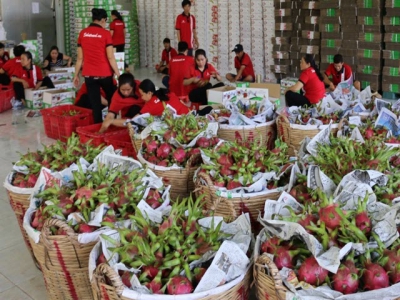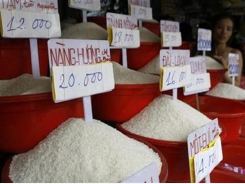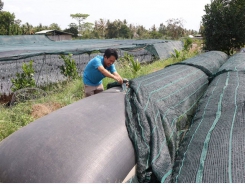Localities loosen management and businesses cheat, Vietnamese agricultural products

If planting areas and packing houses are not checked and supervised well, they will often violate the regulations of the importing country, meaningthe risk of market loss forVietnamese agricultural products is very high.
Granting nearly 1,000 codes of planting areas
According to the latest information from the Plant Protection Department (Ministry of Agriculture and Rural Development), up to now, for the difficult agricultural export markets, Vietnam has been granted 998 planting area codes.
The most issued codes are for the US (471 codes), followed by Australia and New Zealand (393 codes), South Korea (199 codes) and finally Thailand, Japan, and the EU. In addition, 47 packing facility codes have been issued for agricultural products for export to these markets.
For the Chinese market, by August 2020, 47 provinces have submitted a written request and issued 1,735 planting area codes with an area of over 180,000 hectares for nine fresh fruits (dragon fruit, mango, longan, litchi, rambutan, watermelon, banana, jackfruit and mangosteen), which have been exported through official channels and 1,832 codes of packing houses.
Mr. Hoang Trung, Director of the Plant Protection Department, said that in recent years, the inspection and supervision of planting areas and packaging facilities in localities have basically met the requirements.
However, in June 2020, the General Department of Customs of China informed the Vietnamese plant quarantine agency regarding220 batches of mangoes (about 3,300 tons of a total of 750,000 tons exported to China in 2019 and 2020 - accounting for about 0.43% of total export volume) which violated regulations on plant quarantine with many different reasons.
The Chinese side requested to suspend the export of mango from 12 planting regions and 18 packing facilities to coordinate the investigation of the cause, propose remedies and improve management, in which Tien Giang (with 15 codes of packing houses and planting areas) is highest, followed by An Giang (7 codes) and the lowest is Vinh Long (2 codes).
"Although the percentage of packing house numbers and planting areas being suspended from export by China is not large, this is a sign that the inspection, supervision and management of planting area codes for export should be promptly reviewed and rectified," Mr. Hoang Trung said.
Lacking management from localities, businesses cheat
The Plant Protection Department said that, through inspection and review, it is possible to find that there are still some problems related to the management and supervision of the planting area codes and packing houses.
Specifically, the management of codes in some localities is still loose and has not been focused ordeveloped a plan and implemented the inspection and supervision of planting areas and packing houses after getting the codes.
In addition, the link between the planting areas and packing houses with the local and central management agencies to control exported goods has not been tight enough.
Notably, many localities have not assigned a specialized agency to act as a focal point to manage, supervise and guide the inspection and management of planting areas and packing facilities. This leads to inconsistencies in the work handling process.
On the side of exporting enterprises, some enterprises use incorrect codes, impersonating each other's codes for export. This not only affects the reputation of Vietnamese fruit products for export but also directly affects the code owners.
Many agricultural experts said that if you do not inspect and supervise the planting areas and packing houses, it will seriously affect the reputation of Vietnamese agricultural products in the international market as well as directly affect the economic benefits of farmers.
The risk of losing the market is very high if there are many planting areas and packing houses that violate the regulations of the importing country.
In the future, in order to better manage this issue, the Ministry of Agriculture and Rural Development determines to continue to direct the formation of product chain linkages from planting regions, packing houses, exporters, localities and state management agencies to prevent export products from the planting area or packing houses that do not have codes.
At the local level, the MARD stated clearly that it is necessary to assign specific staff and focal agencies to manage and supervise planting areas and packing houses that have codes. This is the unit for MARD to implement related specific technical activities.
At the same time, they will strengthen linkages with planting regions and packaging houses to control exports from planting areas and packaging houses to avoid code theft as well as violations related to the use of codes.
The granting of codes for planting areas and packing houses is currently being implemented in accordance with regulations of the importing country. Accordingly, only agricultural products (mainly fresh fruits and vegetables) produced from planting areas and packaging houses are allowed to be exported to countries such as the US, Australia, Japan, South Korea and China.
If the planting areas or packing houses are not granted codes, the agricultural products are not eligible for export as per the request of the importing country.
Có thể bạn quan tâm
Phần mềm

Phối trộn thức ăn chăn nuôi

Pha dung dịch thủy canh

Định mức cho tôm ăn

Phối trộn phân bón NPK

Xác định tỷ lệ tôm sống

Chuyển đổi đơn vị phân bón

Xác định công suất sục khí

Chuyển đổi đơn vị tôm

Tính diện tích nhà kính

Tính thể tích ao hồ



 Doors wide open for local farm produce to…
Doors wide open for local farm produce to…  Bến Tre households store rainwater during dry season
Bến Tre households store rainwater during dry season